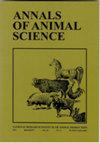锌纳米颗粒和/或灵菌肽在减轻兔热应激中的应用
IF 2.2
4区 农林科学
Q2 AGRICULTURE, DAIRY & ANIMAL SCIENCE
引用次数: 0
摘要
摘要热应激是一种影响动物健康、生产力和福利的环境挑战。本工作旨在检测氧化锌纳米颗粒(ZnNPs)和/或灵菌肽(PRG)对生长兔HS引发的炎症、免疫功能障碍、氧化应激和内质网(ER)应激的保护作用。生长中的断奶兔子(100只雄性,35天大)被随机分为四组。第一组在HS条件下连续8周喂食不补充的基础日粮,第二组、第三组和第四组喂食含有氧化锌纳米颗粒(ZnNPs,50mg/kg日粮)、灵菌肽(PRG,100mg/kg日粮)或其混合物(ZnPRG)的日粮。与HS组相比,含ZnNP和/或PRG的饮食显著提高了FBW(最终体重)、CBWG(累积体重增加)和FCR(饲料转化率),对CFI(累积饲料摄入量)没有实质性影响。所有补充治疗均显著显示RBCs、血红蛋白和血小板的值增加,WBCs、嗜碱性粒细胞和单核细胞的值显著降低,对红细胞压积、MCV、MCHC、中性粒细胞和嗜酸性粒细胞的影响无统计学意义。与HS组相比,所有补充组的TNFα、IL4、IFN-γ、TLR-4和淀粉样蛋白a水平和DNA损伤标记物(Ohdg)均显著降低,NO和溶酶体活性水平显著升高。ZnPRG组兔的Ig G和Ig M水平显著高于其他组。在高温条件下,ZnNPs(50mg)和PRG(100mg)的混合物对CAT和GSH水平的影响最大。此外,与HS组相比,PRG和ZnNPS两种处理均显著降低了MDA和MYO的值(P<0.001),而所有处理组的PC含量均显著降低。与ZnPRG共同补充显示,在HS条件诱导的肝组织中,网状氧化性如GRP78和IRE1的较高免疫表达显著恢复。与单独治疗相比,ZnNPs和PRG的混合物在减轻HS对兔子的不利影响方面表现出更强的效果。总之,ZnNP和/或PRG减轻了氧化应激和DNA损伤。此外,它增强了应激兔肝组织的抗氧化能力和免疫功能,并下调了应激兔肝脏组织中的GRP78和IRE1信号传导。本文章由计算机程序翻译,如有差异,请以英文原文为准。
Use of zinc nanoparticles and/or prodigiosin to mitigate heat stress in rabbits
Abstract Heat stress (HS) is an environmental challenge affecting animals' health, productivity and welfare. This work aimed to inspect the protective effect of zinc oxide nanoparticles (ZnNPs) and/or prodigiosin (PRG) against inflammation, immune dysfunction, oxidative stress and endoplasmic reticulum (ER) stress triggered by HS in growing rabbits. Growing weaned rabbits (one hundred males, 35 days of age) were randomly assigned into four groups. The first group fed a basal diet without supplementation and the 2nd, 3rd, and 4th groups fed diets containing zinc oxide nanoparticles (ZnNPs, 50mg/kg diet), prodigiosin (PRG, 100 mg/kg diet) or their mixture (ZnPRG) under HS conditions for eight successive weeks. The dietary inclusion with ZnNPs and/or PRG significantly boosted FBW (final body weight), CBWG (cumulative body weight gain), and FCR (feed conversion ratio) and had no substantial impacts on the CFI (cumulative feed intake) as compared with those in HS one. All supplemented treatments significantly unveiled an increase in the values of RBCs, hemoglobin, and platelets and significantly decreased in WBCs, basophils and monocytes with non-statistically effects on hematocrit, MCV, MCHC, neutrophils and eosinophils. Compared with the HS group, all supplemental groups showed a significant reduction in TNFα, IL4, IFN-γ, TLR-4 and amyloid A levels and DNA damage markers (Ohdg) and significantly increased in the levels of NO and lysosome activity. Rabbits in the ZnPRG group had significantly higher Ig G and Ig M levels than in other groups. The highest value of CAT and GSH levels were found in rabbits received the mixture of ZnNPs (50mg) and PRG (100mg) in their diets under elevated temperatures. Additionally, both treatments, PRG and ZnNPS, significantly (P<0.001) reduced the values of MDA and MYO, while all treated groups had significantly reduced PC contents compared with the HS group. Co-supplement with ZnPRG showed a considerable restoration in the higher immune expression of reticulum oxidative such GRP78 and IRE1 in hepatic tissues induced by HS conditions. The mixture of ZnNPs and PRG presented more robust effects in mitigating the adverse impacts of HS in rabbits compared with the individual treatments. Collectively, ZnNPs and/or PRG alleviated oxidative stress and DNA damage. In addition, it enhanced the antioxidant capacity and immune function, and downregulated ER stress such as GRP78 and IRE1 signaling in the hepatic tissues of stressed rabbits.
求助全文
通过发布文献求助,成功后即可免费获取论文全文。
去求助
来源期刊

Annals of Animal Science
农林科学-奶制品与动物科学
CiteScore
4.00
自引率
5.30%
发文量
138
审稿时长
6-12 weeks
期刊介绍:
Annals of Animal Science accepts original papers and reviews from the different topics of animal science: genetic and farm animal breeding, the biology, physiology and reproduction of animals, animal nutrition and feedstuffs, environment, hygiene and animal production technology, quality of animal origin products, economics and the organization of animal production.
 求助内容:
求助内容: 应助结果提醒方式:
应助结果提醒方式:


